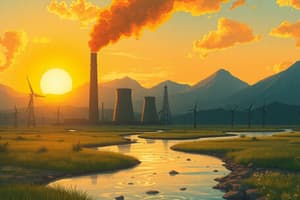Podcast
Questions and Answers
What is the major disadvantage of mining coal, apart from its environmental impact?
What is the major disadvantage of mining coal, apart from its environmental impact?
Major threat to health
What is an advantage of natural gas over coal and oil?
What is an advantage of natural gas over coal and oil?
Produces lower levels of many air pollutants
What is a characteristic that defines renewable resources?
What is a characteristic that defines renewable resources?
Can be replenished in a short period of time
What is one of the main uses of oil in industry?
What is one of the main uses of oil in industry?
What is an advantage of geothermal energy?
What is an advantage of geothermal energy?
Why is energy from the sun considered a renewable resource?
Why is energy from the sun considered a renewable resource?
What is a key characteristic of a nonrenewable resource?
What is a key characteristic of a nonrenewable resource?
What is the primary material used to create energy in nuclear fission?
What is the primary material used to create energy in nuclear fission?
What was the consequence of the mechanical and human errors at the Three Mile Island reactor in 1979?
What was the consequence of the mechanical and human errors at the Three Mile Island reactor in 1979?
What are some examples of nonrenewable energy resources?
What are some examples of nonrenewable energy resources?
Why is nuclear energy considered a nonrenewable resource?
Why is nuclear energy considered a nonrenewable resource?
What was the date of the Chernobyl reactor explosion and what was the consequence?
What was the date of the Chernobyl reactor explosion and what was the consequence?
Why are coal, petroleum, and natural gas considered nonrenewable?
Why are coal, petroleum, and natural gas considered nonrenewable?
What is a major advantage of coal in the United States?
What is a major advantage of coal in the United States?
What is a difference in energy production between oil/natural gas and wood?
What is a difference in energy production between oil/natural gas and wood?
What was the location of the second nuclear disaster mentioned in the text?
What was the location of the second nuclear disaster mentioned in the text?
What is estimated to be the cost of the Chernobyl incident?
What is estimated to be the cost of the Chernobyl incident?
Flashcards are hidden until you start studying
Study Notes
Fossil Fuels Overview
- Fossil fuels include coal, petroleum, and natural gas, classified as nonrenewable resources due to their inability to replenish quickly relative to consumption.
- Fossil fuels are primarily composed of hydrocarbons.
Coal
- High net energy yield; can be burned directly for heat.
- Disadvantages:
- Most polluted fuel, emitting particulate matter, carbon dioxide, and sulfur dioxide.
- Mining leads to significant environmental degradation.
- Major health risks associated with its combustion and mining practices.
- Abundant resource with 300 years of U.S. reserves, contributing to national energy independence.
Natural Gas
- A mixture primarily of methane, used for electricity generation, heating, industrial processes, vehicle fuel, and cooking.
- Advantages:
- Produces large energy quantities with lower air pollutants than coal or oil.
- Easy transportation.
- Disadvantage: Highly flammable nature poses safety hazards.
Oil/Petroleum
- Crude oil deposits are extracted through drilling.
- Utilized extensively in industry and transportation sectors.
- Infrastructure for oil and gas is already established, facilitating energy distribution.
- Risks of spills during extraction and transportation.
Renewable Resources
- Renewable resources can replenish naturally within a short timeframe, including solar, geothermal, wind, biomass, and water.
Solar Energy
- Energy harnessed from the sun, considered renewable due to its continuous nature.
Geothermal Energy
- Uses the earth's heat as an unlimited and cost-effective source of energy.
Nuclear Energy
- Generation through nuclear fission, utilizing uranium.
- Nonrenewable as uranium is finite once consumed.
Chernobyl Disaster
- Occurred on April 26, 1986, in Ukraine; a reactor explosion released radioactive debris.
- Health impacts included an official report of 3,576 deaths, while Greenpeace estimated up to 32,000 deaths.
- Approximately 400,000 evacuees from a contaminated area of about 160,000 square kilometers.
- The incident incurred costs exceeding $358 billion.
Fukushima Disaster
- March 2011; preceded by an earthquake and tsunami leading to loss of power for reactor cooling and fire outbreaks.
Three Mile Island Incident
- March 29, 1979, near Harrisburg, Pennsylvania; a partial meltdown due to coolant loss caused by mechanical and human errors.
- Evacuation of 50,000 people, with another 50,000 fleeing the area.
- Unknown quantities of radioactive material released; cleanup and damages estimated at $1.2 billion, with increased cancer rates as a consequence.
Studying That Suits You
Use AI to generate personalized quizzes and flashcards to suit your learning preferences.



